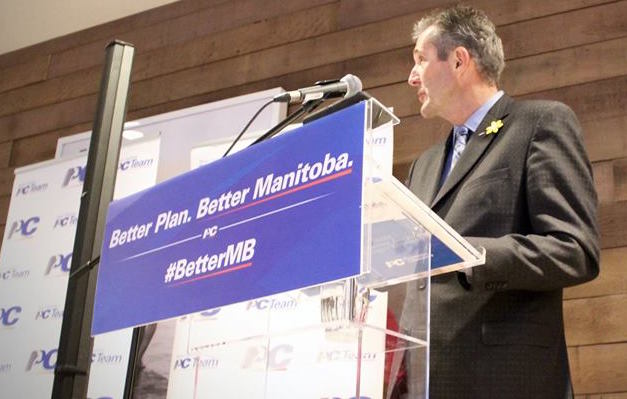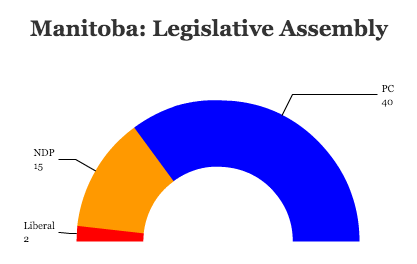
No one will remember Brian Pallister’s nearly decade-long career in Ottawa as a backbench Conservative member of the House of Commons as particularly distinguished.![]()
![]()
Over the course of eight years, Pallister never once served as a minister in former prime minister Stephen Harper’s cabinet. His most pivotal moment, until tonight, may have come in 1998 when, as a rising legislator in Manitoba’s provincial assembly, he waged a challenge for the leadership of the Progressive Conservative Party. He lost handily to former prime minister Joe Clark. Pallister eventually transitioned to federal politics as a legislator for the Canadian Alliance, a more socially conservative and western-based alternative to the Progressive Conservatives — and a party that ultimately effected a merger with the Canadian Alliance in 2003 under Harper’s leadership.
Pallister returned to provincial politics in 2012, winning an uncontested leadership bid for Manitoba’s Progressive Conservatives, and for the past four years, that’s meant playing the role of inoffensive alternative to Manitoba’s premier, Greg Selinger, who angered even his own party’s caucus when in April 2013 he reversed a campaign pledge and raised the provincial sales tax from 7% to 8%.
Tonight, however, Pallister becomes the first leader of a provincial Conservative or Progressive Conservative party to win power in the era of prime minister Justin Trudeau. He’ll join another small-c conservative, Brad Wall, who two weeks ago won reelection to a third term as premier of Saskatchewan under the banner of the center-right Saskatchewan Party.
Pallister’s Progressive Conservatives will win over 53% of the vote, more than double that of the NDP and the Liberal Party (long an anemic third force in Manitoba’s politics). The massive defeat of Manitoba’s New Democratic Party (NDP) ends a 17-year stint in government that leaves the NDP, across Canada, in power solely in Alberta, where Rachel Notley won an astounding victory last May.
Throughout his leadership, Pallister has backtracked on his one-time opposition to same-sex marriage, and he’s struggled to convince voters that he can be an ally to the LGBT community. Pallister has also soft-pedaled the extent to which a Tory government in Manitoba would enact spending cuts. In fact, Pallister faced so little scrutiny that he was able to spend nearly one out of every five days in Costa Rica since his return as a member of Manitoba’s legislative assembly in 2012 without anyone noticing. Last week, a Costa Rican newspaper first reported the extent of Pallister’s time abroad, including the fact that Pallister was in Costa Rica while Manitoba was suffering from crisis-level flooding in 2014.
Pallister, it’s safe to say, isn’t exactly as hip as Trudeau, Canada’s youthful new prime minister. In the leader’s debate earlier this month, Manitoba’s Liberal Party leader Rana Bokhari mocked Pallister when he dubbed a NDP middle-class tax credit proposal the ‘Nickelback’ plan, in reference to the Alberta-based rock band known chiefly for its widespread unpopularity.
Nevertheless, Pallister’s Tories pledged to cut the sales tax back down to 7%, spend more on infrastructure, create incentives for businesses in the north of the province, and (just like the NDP) find a way to cut ambulance fees by 50%.
The late-breaking brouhaha over Pallister’s lengthy vacations in Costa Rica didn’t seem to matter to voters, however, who have delivered the Tories a majority government for the first time since 1999, bringing to an end one of the most impressive NDP governing stints in history, which began with a decade under former premier Gary Doer. His tenure throughout the 2000s coincided with general prosperity and flowing revenues that provided Doer with the ability to meet balanced budgets and implement tax cuts. Doer, a pragmatic centrist — sometimes out of sync with national NDP leaders — had no problem welcoming Monsanto and other large agricultural behemoths to the policymaking table, and he championed the rise of fracking in Manitoba.
Selinger, Doer’s long-serving finance minister, became premier in 2009 after Harper appointed Doer as Canada’s ambassador to the United States. But Selinger has had a rockier time in power, coming into office in the face of a global financial panic and ending his tenure in 2015 and 2016 under the weight of a global commodities glut. Though the NDP won reelection to a fourth consecutive term in October 2011, no major opinion poll since 2012 has given the NDP much hope of winning a fifth term.
